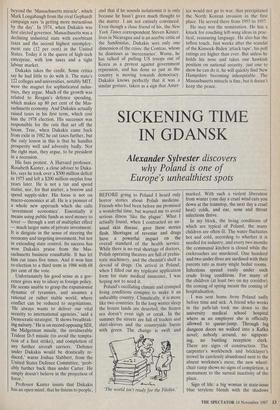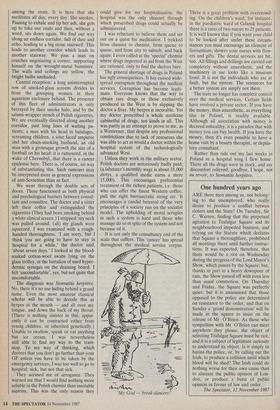SICKENING TIME IN GDANSK
Alexander Sylvester discovers
why Poland is one of Europe's unhealthiest spots
BEFORE going to Poland I heard only horror stories about Polish medicine. Friends who had been before me promised a wonderful time, but warned me to avoid serious illness 'like the plague'. What I actually found, when I contracted an un- usual skin disease, gave these stories flesh. Shortages of revenue and drugs have a powerful impact on the overall standard of the health service. While there is no real shortage of doctors, Polish operating theatres are full of prehis- toric machinery, and the chemist's shelf is devoid of drugs. On arrival in Poland, when I filled out my triplicate application form for state medical insurance, I was hoping not to need it.
Poland's oscillating climate and cramped living conditions conspire to make it an unhealthy country. Climatically, it is more like two countries. In the long winter sleep the frozen lands are deserted, the frozen sea doesn't even sigh or creak. In the summer the streets are full of traders and shirt-sleeves and the countryside bursts with green. The change is swift and The world isn't ready for the Filofax.' marked. With such a violent liberation from winter (one day a cruel wind cuts you down at the tramstop, the next day a cruel heat) colds, and ear, nose and throat infections thrive.
In my block, the living conditions of which are typical of Poland, the many children are often ill. The water fluctuates hot and cold, according to whether it is needed for industry, and every two months the communal kitchen is closed while the cockroaches are murdered. One hundred and two under-fives are sardined with their parents into as many single bedsit rooms. Infections spread easily under such crude living conditions. For many of the children (at least two on my corridor) the coming of spring meant the coming of hospitalisation.
I was sent home from Poland sadly before time and sick. A friend who works in the path-lab took me down to the university medical school hospital where as an employee she is officially allowed to queue-jump. Through big dungeon doors we walked into a Kafka novel; nobody around, no signpost- ing, no bustling reception clerk. There are signs of construction. The carpenter's workbench and bricklayer's trowel lie carelessly abandoned next to the absent workmen's mess; the new wheel- chair ramp shows no signs of completion, a monument to the surreal inactivity of the place.
Sign of life: a big woman in state-issue blue terylene blends with the shadows among the coats. It is here that she meditates all day, every day. She smokes. Pausing to exhale and tip her ash, she gets up to take our coats and then, without a word, sits down again. We find our way along an endless corridor, full of dust and echo, leading to a big stone stairwell. This leads to another corridor which leads to another stairway. We pass a man on crutches negotiating a corner, supporting himself on the wrought-metal bannister. The walls and ceilings are yellow, the bright bulbs unshaded.
Central reception: a long uninterrupted row of smoked-glass screens divides us from the gossiping women in their aquarium enclosure behind. The presence of this fleet of administrators is only betrayed by their smoke halo, and by the salami-wrapper stench of Polish cigarettes. We are eventually directed along another corridor, past long lines of waiting pa- tients; a man with his head in bandages, screaming children, a sour faced amputee and her chain-smoking husband, an old man with a grotesque growth the size of a football on his head: it is rumoured, in the wake of Chernobyl, that there is a cancer epidemic here. There is, of course, no way of substantiating this. Such rumours may be interpreted more as general expressions of anti-Sovietism than as fact.
We went through the double sets of doors. These functioned as both physical and psychological barriers between consul- tant and consultee. The doctor and a sister left their coffee and extinguished the cigarettes (They had been smoking behind a white clinical screen.) I stripped: my neck was pulled around, (all) my glands were squeezed, I was examined with a rough- handed thoroughness. 'I am sorry, but I think you are going to have to stay in hospital for a while,' the doctor said, `about seven days.' I looked at the blood- soaked cotton-wool swabs lying on the glass trolley, at the battalion of used hyper- dermic syringes on the draining board. I felt 'uncomfortable', yes, but not quite that uncomfortable.
The diagnosis was Stomatitis herpitive. No, there it's no use hiding behind a grand name. Even the most amateur classical scholar will be able to decode this as herpes in the mouth — and all over my tongue, and down the back of my throat. (There is nothing sinister in this, appar- ently it can be contracted either from young children, or inherited genetically.) Unable to swallow, speak or eat anything but ice cream, I was nevertheless still able to find my way to the tram- stop. To my way of thinking, which decrees that you don't go further than your GP unless you have to be taken by the emergency services, I was too well to go to hospital: sick, but not that sick.
They accused me of arrogance. They warned me that I would find nothing more soluble in the Polish chemist than insoluble aspirins. This was the only reason they could give for my hospitalisation; the hospital was the only channel through which prescribed drugs could actually be administered.
I was reluctant to believe them and set out on a quest for medication. I trekked from chemist to chemist, from queue to queue, and from city to suburb, and back again; I even called at the 'special' chemist where drugs imported as aid from the West are rationed, only to find the shelves bare.
The general shortage of drugs in Poland has ugly consequences. It has caused wide- spread corruption throughout the medical services. Corruption has become legiti- mate. Everyone knows that the way to obtain rare drugs or those exclusively produced in the West is by slipping the doctor a fiver. My herpes is incurable. Yet my doctor prescribed a whole medicine cabinetful of drugs, ten kinds in all. This was partly in an attempt to prove to me, as a Westerner, that despite any professional constrictions due to lack of resources she was able to act as would a doctor within the hospital system of the technologically advanced West.
Unless they work in the military sector, Polish doctors are notoriously badly paid; (a labourer's monthly wage is about 35,000 zlotys, a qualified medic earns a mere 15,000). This encourages preferential treatment of the richest patients, i.e. those who can offer the finest Western coffee, pull the right bureaucratic string etc. It encourages a candid betrayal of the very principles of a society run on the socialist model. The upholding of moral scruples in such a system is hard and those who manage do so in spite of the system and not because of it.
It is not only the consultancy end of the scale that suffers. This 'cancer' has spread throughout the medical service corpus.
'My God — break-dancers!' There is a great problem with overcrowd- ing. On the children's ward, for instance, in the paediatric ward of Gdansk hospital there is a ratio of two nurses to 25 patients. It is well known that if you want your child to be looked after under these circum- stances you must encourage an element of favouritism; shower your nurses with flow- ers and gifts. The dental services are hit, too. All fillings and drillings are carried out completely without anaesthetic, and the machinery in use looks like a museum fossil. It is not the individuals who are at fault, but the system. The resources for a better system are simply not there.
The state no longer has complete control over the medical services. Certain fields have evolved a private sector. If you have the money, then anaesthetic, as everything else in Poland, is readily available. Although all association with money is decreed unhealthy, it is a paradox that with money you can buy health. If you have the money, then it's even possible to have a home visit by a beauty therapist, or depila- tory consultant.
Rather than ride out my last weeks in Poland in a hospital wing I flew home. There all the drugs were in stock, and my discomfort relieved; goodbye, I hope, not au revoir, to Stomatitis herpitive.











































































 Previous page
Previous page